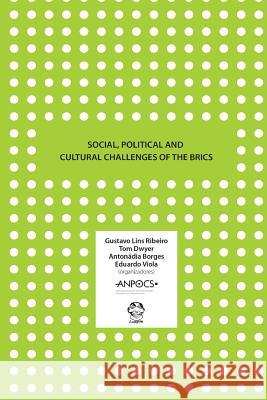Social, Political and Cultural Challenges of the BRICS » książka
Social, Political and Cultural Challenges of the BRICS
ISBN-13: 9789956792146 / Angielski / Miękka / 2015 / 504 str.
For the almost 40 years of its existence, ANPOCS has contributed to introducing or consolidating new thematic areas in the academic agenda of debates in the Brazilian social sciences. Commensurate with this history, at the 37th Annual meeting, hosted in Aguas de Lindoia, Sao Paulo, in 2013, we organized a large International Symposium, The BRICS and their social, political and cultural challenges on the national and international levels. There were six sessions of debates, gathered under the umbrella of "Development and public policies," "Social inclusion and social justice," and "Emerging powers and transformations in the international system," followed by a final plenary session. Around 30 anthropologists, political scientists, sociologists and researchers in international relations from Brazil, Russia, India, China and South Africa, met over three highly productive days. As might be expected at ANPOCS, the encounter was marked not only by the diversity of countries and disciplines, but also by the theoretical and political diversity of the participants, something already apparent in the composition of the Brazilian coordinators of the Symposium. This book is just one tangible outcome of the papers and dialogues emerging from this encounter. Like the Symposium, the volume is divided into three sections. Looking to address an international readership, it is published in Portuguese and English."
For the almost 40 years of its existence, ANPOCS has contributed to introducing or consolidating new thematic areas in the academic agenda of debates in the Brazilian social sciences. Commensurate with this history, at the 37th Annual meeting, hosted in Águas de Lindoia, São Paulo, in 2013, we organized a large International Symposium, The BRICS and their social, political and cultural challenges on the national and international levels. There were six sessions of debates, gathered under the umbrella of "Development and public policies," "Social inclusion and social justice," and "Emerging powers and transformations in the international system," followed by a final plenary session. Around 30 anthropologists, political scientists, sociologists and researchers in international relations from Brazil, Russia, India, China and South Africa, met over three highly productive days. As might be expected at ANPOCS, the encounter was marked not only by the diversity of countries and disciplines, but also by the theoretical and political diversity of the participants, something already apparent in the composition of the Brazilian coordinators of the Symposium. This book is just one tangible outcome of the papers and dialogues emerging from this encounter. Like the Symposium, the volume is divided into three sections. Looking to address an international readership, it is published in Portuguese and English.











